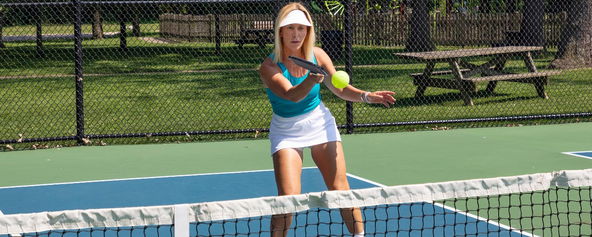
Pickleball rule changes for 2025
In the November/December edition of Pickleball Magazine, referee Bob Unetich shared a number of rule changes possibly coming into effect in the new year.
One hundred thirty-three change requests were submitted to the USA Pickleball Rules Committee by May 15, 2024, and 46 were ultimately recommended to the USA Pickleball Board of Directors for final approval.
While some recommended changes involve rather straightforward modifications with respect to wording, others could genuinely impact the game itself.
The 2025 Rulebook will be available on January 1.
Here are key rule changes on the table, according to Unetich:
- Rule 9.B.1 will define a volley to begin “when a ball is struck” not “when the swing begins,” which makes a paddle scrape in the NVZ before contact with a ball, under 9.B.2, not a fault.
It also means that when exiting the NVZ to hit a volley, it is the placement of your feet when the ball is struck, not at the swing of the paddle.
- A change to Rule 10.C would permit coaching when the rally ends, instead of only at a time-out.
- A change to the Technical Warning and Technical Fault rules under new Rule 13.G.4 would enable a tournament director to “carry over” a penalty to the team’s next match, including a point that might be awarded to the next opponent.
- The new version of Rule 2.E.5.c permits autographs on paddles.
- There is now a 1-inch tolerance on net-post-to-net-post spacing (Rule 2.C.2) and a quarter-inch tolerance on net height (Rule 2.C.5).
- Tournament Operations can, using new Rule 12.P, make changes in order to rectify “operational errors.”
- A revised Rule 12.F.2 has been amended to agree with Rule 10.B.2.c, which permits a team to use regular time-outs, if available, “after a medical time-out has expired, to allow more time before the match must be retired.”
- Rally scoring can be used in pro doubles brackets according to a new rule, 12.B.1, with scoring done according to Rule 4.G.
- Open Gender brackets are a sanctioned tournament approved format, under Rule 12.A, permitting men, women and transgender players to compete against each other.
- It is a fault under new Rule 4.B.10 when an incorrect server or receiver hits the ball if the players know who the correct hitter should have been. Under the new rule, a change restricts replays to only those scenarios where the referee and players mistakenly allow the incorrect player to serve or receive.
- After a player crosses the plane of the net, following the path of a ball strike, they must return promptly to their own side of the net to comply with revised Rule 11.1.
- Paddles that can significantly alter play are not permitted, according to a recommended change under Appendix: Guiding Principles.
- A Round Robin tie break method that is selected, according to Rule 12.C.4, must remain the same to resolve additional ties after the first tie-break method has been applied.
- The Mini Singles NVZ is clarified to be 10 feet wide instead of 20 feet wide under Rule 3.A.22.
- Rule 4.L was shortened to make it agree with Rule 4.A.4 concerning service foot faults.
- Under a revision to 13.D.1.c and d, a player in a non-officiated match can call any type of NVZ fault on an opponent, not only foot faults as previously stated in the rule.
- Another small change to 13.D.1 is that a disagreement between teams calls for a replay, and a disagreement between partners will be decided to the benefit of the opponents.
- Rule 13.D.1.d, regarding faults called in non-officiated play, also was changed to clarify that a player can mention a specific fault - except for NVZ faults and service foot faults, which can be called immediately - to opponents only after a rally ends.
- Line call appeals to a referee, covered by Rule 13.F.3, must be filed before the scoresheet is initialed, establishing a time limit for appeals.
- The definition of a “live ball” in Rule 3.A.20 is altered slightly to say that this “period of time” ends “when the ball becomes dead.”
Unetich concludes by confirming that a recommendation to require mandatory eye protection was not approved.
That was also the case for a proposed change to calling a replay instead of calling a fault if a player strikes the ball while the score is being called.
Click here to learn more about Pickleball Magazine.
Related articles

Understanding pickleball kitchen rules
Mastering the nuances of the non-volley zone can dramatically improve your strategy and performance
192 days ago
-Pickleball.com Staff

Connor Garnett debunks the five biggest mistakes your pickleball coach has taught you
The men's singles standout sets the record straight to improve your overall game.
382 days ago
-Victoria Radnothy

Pickleball rule changes for 2025
There are quite a few on a tap.
416 days ago
-Pickleball.com Staff

How to Get More Power in Your Pickleball Forehand Drives
John Cincola can help take your game to the next level.
418 days ago
-Victoria Radnothy